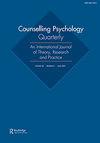What works in the treatment of medically unexplained physical symptoms? The psychotherapist perspective
IF 1.6
Q3 PSYCHOLOGY, APPLIED
引用次数: 1
Abstract
ABSTRACT People with medically unexplained physical symptoms (MUPS) are often referred to psychotherapy, which has been shown to be modestly effective in reducing symptom severity. An investigation of clinical strategies used by experienced psychotherapists in the treatment of clients with MUPS may offer important insights into the treatment process with this challenging group of clients and help further improve the effectiveness of psychotherapy. Individual interviews with 31 psychotherapists experienced in the treatment of adult clients with MUPS were collected. The grounded theory method was used to identify clinical strategies. Clinical strategies were organized into three treatment phases. In the first phase, the psychotherapists’ intention was to draw clients who may resist the psychological view of somatic symptoms into psychotherapy. In the second phase, the psychotherapists aimed to influence the impact of the symptoms on clients’ lives. In the third phase, the psychotherapists focused on reinforcing the clients’ gains from treatment, and they remained open to treatment continuation. The clinical strategies shared by psychotherapists with diverse theoretical orientations point to common mechanisms of change in the treatment of clients with MUPS. Psychotherapists’ responsiveness to client preparedness for psychotherapy appears to be important for specifically challenging clients.什么能有效治疗医学上无法解释的身体症状?心理治疗师的观点
患有医学上无法解释的身体症状(MUPS)的人通常会接受心理治疗,这已被证明在减轻症状严重程度方面有一定的效果。对经验丰富的心理治疗师在治疗MUPS患者时使用的临床策略进行调查,可能会为这一具有挑战性的客户群体的治疗过程提供重要的见解,并有助于进一步提高心理治疗的有效性。对31位有治疗成年MUPS经验的心理治疗师进行了个人访谈。采用扎根理论方法确定临床策略。临床策略分为三个治疗阶段。在第一阶段,心理治疗师的意图是吸引那些可能抗拒身体症状的心理学观点的来访者进入心理治疗。在第二阶段,心理治疗师的目标是影响症状对来访者生活的影响。在第三阶段,心理治疗师专注于强化来访者从治疗中获得的收益,他们对治疗的继续持开放态度。不同理论取向的心理治疗师分享的临床策略指出了治疗MUPS患者的共同变化机制。心理治疗师对客户心理治疗准备的反应似乎对特别具有挑战性的客户很重要。
本文章由计算机程序翻译,如有差异,请以英文原文为准。
求助全文
约1分钟内获得全文
求助全文
来源期刊

Counselling Psychology Quarterly
PSYCHOLOGY, APPLIED-
CiteScore
6.20
自引率
6.70%
发文量
30
期刊介绍:
Counselling Psychology Quarterly is an international interdisciplinary journal, reporting on practice, research and theory. The journal is particularly keen to encourage and publish papers which will be of immediate practical relevance to counselling, clinical, occupational, health and medical psychologists throughout the world. Original, independently refereed contributions will be included on practice, research and theory - and especially articles which integrate these three areas - from whatever methodological or theoretical standpoint. The journal will also include international peer review commentaries on major issues.
 求助内容:
求助内容: 应助结果提醒方式:
应助结果提醒方式:


